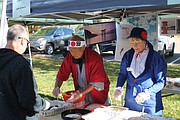Quincy celebrates a tapestry of cultures
JOEL MARTIN | Hagadone News Network | UPDATED 7 years, 4 months AGO
Joel Martin has been with the Columbia Basin Herald for more than 25 years in a variety of roles and is the most-tenured employee in the building. Martin is a married father of eight and enjoys spending time with his children and his wife, Christina. He is passionate about the paper’s mission of informing the people of the Columbia Basin because he knows it is important to record the history of the communities the publication serves. | October 14, 2018 11:39 PM
QUINCY — The weather may have been windier than a truckload of campaign promises, but the first annual Celebration of Cultures in Quincy still drew a good-sized crowd to Heritage Park Saturday. Around 500 people came out for food, art, music and dancing from around the world, organizer Harriet Weber estimated.
One enjoyable way to experience a new culture is by trying its food, and yummy stuff was in abundance. Attendees bought tickets at the entrance to the park to spend at the food booths rather than using cash directly. Pupusas from El Salvador, German sausage and Jalisco-style tacos were popular offerings.
What makes Jalisco tacos different from other tacos? Fidencio Lopez stopped serving them up for a moment to answer.
“Jalisco makes the best tacos...”
“On the planet,” supplied his son Edwin.
“In the universe!” Fidencio finished proudly.
Not far away Janet Van Dienst of Quincy, assisted by some friends from Lynden in northwestern Washington, was serving up cookies and pastries from the Netherlands. Especially popular were her freshly deep-fried olie bollen, which are sort of like donut holes. The name means “oil balls,” which may not sound like the most appetizing of names, but that didn’t seem to deter the line of people waiting to get their hands on some.
Japan and England shared a booth, not for lack of space but because the couple representing those countries are married and have been for 45 years. Beryl Goto, who emigrated from London, served out English trifle while her husband Andy, born in Seattle to Japanese parents, offered up sushi. Beryl made all the food for both of them, they said.
Food wasn’t all that was available. In the barn, various performances were going on including mariachi, Irish step dance, American clogging and classical Kalalaya dancing from India. Meanwhile, Mandy Ottley taught kids to do primitive knitting from Scotland, wrapping yarn around two thick sticks to form rows that could be combined into a blanket, while other craft enthusiasts learned about gyotaku, or Japanese fish painting. The Wanapum tribe brought its Native American Discovery Unit, a large bus with displays of traditional Wanapum culture.
The event replaced the annual Harvest Festival in Quincy, Weber said. For next year, “we’ve already had people come forward and say that they would like to share food or something from their culture.”
“There’s at least 24 distinct countries of origin from people that we know of who are living in Quincy,” she added. “We can’t do them all every year, but highlighting five or six a year might be a good goal.”
Sonia Padron, who was selling food tickets, was gung-ho about the future.
“As soon as we shut this one down we’ll be talking about next year,” she said.
ARTICLES BY JOEL MARTIN

Space Burger booth open March 13-15
MOSES LAKE — Those who can’t wait for the Grant County Fair can get their Space Burger fix next weekend, according to an announcement from the Lioness Club of Moses Lake. The iconic Grant County sandwiches will be available at the Grant County Fairgrounds March 13-15, according to the announcement. There is no admission fee to get into the fairgrounds that weekend.

SENIOR EVENTS: March 2026
COLUMBIA BASIN — Plays, art shows, auctions and more await seniors in the Columbia Basin this month. Here are some opportunities to get out and about in March.

Valentine’s Day cards flood Brookdale Hearthstone with love
MOSES LAKE — Residents at Brookdale Hearthstone Assisted Living in Moses Lake got Valentine’s Day greetings from across the country last month. “I believe that the only states we have not received (cards from) yet are Vermont and Maine,” Lifestyle Director Imelda Broyles said Feb. 24. “We keep receiving new cards every single day. They have not stopped. My residents are in awe with every single one of the cards that we’ve been receiving.” The Hearts Across America project started as a way for children in school classrooms to exchange Valentine’s Day cards with classes in other states or even countries, but the idea has expanded to senior living facilities, according to the project’s social media.



